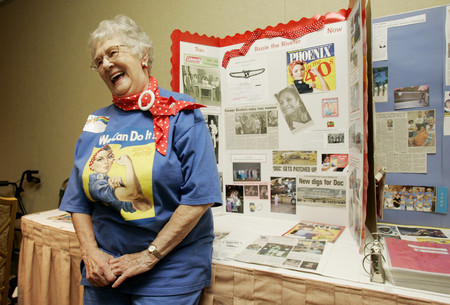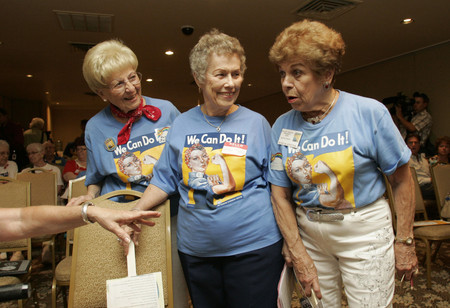Retelling Their Riveting Tales
Happy Sargol doesn't care if people remember her -- as long as they remember Rosie.
"If they remember Rosie, then we'll all be remembered," said Sargol, 87, of Sun City, Ariz. "But I don't think we're really in the schoolbooks, so we have to remind people ourselves."
The Rosie in question is the cultural icon Rosie the Riveter, which refers to the 16 million women who left their homes to work and volunteer for industrial or government jobs relating to the World War II war effort.
It was the first time women had entered the work force en masse in the United States.
After the war ended, the Rosies were expected to return to their homes, but many weren't satisfied to resume their old lives.
"This was the beginning of the feminist movement," said Arkie Huffman, 84. "This gave women the opportunity to show what they could do."
About 20 Rosies registered for the 11th reunion of the American Rosie the Riveter Association at Imperial Palace on Friday, where a statement from the mayor's office proclaimed June 19 as National Rosie Day in Las Vegas.
The reunion was an opportunity to chat with old friends, make new ones and introduce daughters and granddaughters -- called "rosebuds" -- to the history that some feel has been overlooked.
At a restaurant Huffman frequents with members of her local Rosie group, a waitress had her daughter interview the whole group for a class project.
"It was so interesting that she ended up presenting it to the whole school," she said. "I really don't think people know about us."
While children might not read about the Rosies in books, they appreciate the opportunities they have today, she said.
"My daughters are so clever. I told them to be themselves, and you know what? They're individuals, and they're independent, and it's wonderful," she said.
Like any reunion, everyone had a story to tell. Although there were many fun, rewarding times spent in the workplace then, the country was also at war.
Many wives were made widows, and for some, there was other pain.
Shirley Clark, 81, worked in accounting for a top secret project in a Detroit factory. She later learned she was working for the Manhattan Project, which developed the atomic bomb.
"They told us what we'd been doing after the first bomb hit (Hiroshima)," Clark said, wiping away a tear. "We didn't think too much of it then because we had won the war, but something like that wears on you."
Sargol said her experience in the factories was overwhelming but only at first.
"I had never worn slacks before, had never been in a factory," she said.
It wasn't long before she realized that she wasn't out of her league.
"We had several women that taught Morse code to some of the men, and one who even decoded incoming messages," she said. "We could do a lot of the things that the guys couldn't."
William Apodaca, a lieutenant colonel in the Air Force who read the proclamation from the mayor's office, said he had rarely felt such a collective pride in a room.
"Very few will ever sing (the national anthem) with as much emotion as you all did," he said. "I think the military forget the people at home sometimes."
Contact reporter Mike Blasky at mblasky@reviewjournal.com or 702-383-0283.





























